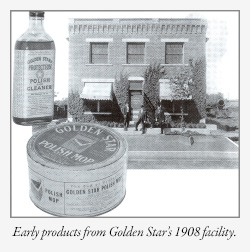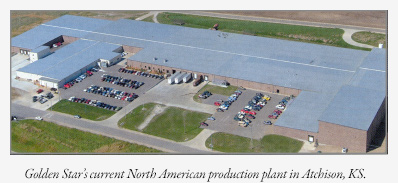Golden Star Inc. 100th Anniversary
"Anything, everything, is possible."
—Thomas Edison, 1908
(Reprinted from ISSA Today, June, 2008)
THE YEAR 1908 began at midnight when a 700-pound "electric ball" fell from the flagpole atop the New York Times building - the first-ever ball-drop in Times Square; it ended a year later with a nearly two-and-ahalf- hour flight by Wilbur Wright, the longest flight ever made in an airplane. In the months between, Henry Ford began producing his first Model T, homes were tidied with a remarkable new device called the vacuum cleaner, and the Metropolitan Life Insurance Co. completed its 700-foot skyscraper in New York City ... the tallest building in the world.
Hope seemed to reign in all fields in 1908: Medical  researchers predicted organ transplants; wireless experts envisioned pocket phones that would make people reachable anywhere; and, after snatching the National League pennant from the New York Giants and thumping the Detroit Tigers in the World Series, Chicago Cubs fans predicted the beginning of a baseball dynasty!
researchers predicted organ transplants; wireless experts envisioned pocket phones that would make people reachable anywhere; and, after snatching the National League pennant from the New York Giants and thumping the Detroit Tigers in the World Series, Chicago Cubs fans predicted the beginning of a baseball dynasty!
This sense of optimism was shared by two businessmen from Pittsburg, KS, Emil Gradinger and R.W. Morris, who noticed that those Model T bodies were being constructed of unfinished steel making them not only quite vulnerable to corrosion, but also perfect for the young entrepreneurs' new automobile "protection polish." Golden Star Polish Manufacturing Co. was soon launched.
Automobile-protection polishes quickly led to cleaners and polishes for many hard surfaces, including wood, metal, ceramic, and glass. During the 1930s, after it was observed that furniture polish was being swabbed on hardwood floors as a sealer, Golden Star invented the "polish mop" and a whole new world of textile manufacturing was introduced to the company. Soon, Golden Star was producing and marketing mops pretreated with its own polish and private labeling mops for many national chemical brands. Clever, refillable metal containers were used to store and re-treat the mops.
Not surprisingly, Golden Star's experience with mop and textile manufacturing led to the introduction of the first cotton "dust control" floor mats in the 1960s and to more durable, efficient, and attractive synthetic-yarn mats in the 1970s.
 While matting and chemicals are no longer part of Golden Star's offering, its textile-manufacturing tradition has flourished worldwide. Today, the Kansas City based company provides floor care and hard surface cleaning solutions from 450,000 square feet of vertically integrated manufacturing facilities in the United States and China. Every aspect of mop, pad, and cloth production is undertaken in each of four plants, including fiber selection; blending and spinning; product research, design, and testing; and ultimately, sewing, finishing, and inspecting. Customers are served from these facilities on six continents in multiple markets.
While matting and chemicals are no longer part of Golden Star's offering, its textile-manufacturing tradition has flourished worldwide. Today, the Kansas City based company provides floor care and hard surface cleaning solutions from 450,000 square feet of vertically integrated manufacturing facilities in the United States and China. Every aspect of mop, pad, and cloth production is undertaken in each of four plants, including fiber selection; blending and spinning; product research, design, and testing; and ultimately, sewing, finishing, and inspecting. Customers are served from these facilities on six continents in multiple markets.
Although much has changed in 100 years, much also remains unchanged. Golden Star's founders, like so many other optimists in 1908, believed that anything was possible in an essential and growing industry, especially when you surround yourself with talented and dedicated associates and visionary and progressive customers. Most of all, they understood that ultimate fortune came from caring about their customers' and the industry's success as much as Golden Star's. "That's a formula we have absolutely no intention of meddling with," says Gary Gradinger, Golden Star's current chairman and CEO and grandson of co-founder Emil. "Indeed, it is and will always be a great pleasure building this business in the reflection our creative, energetic, determined, enterprising, principled and personable customers."
